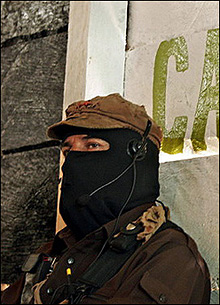 |
 |
 |
 News Around the Republic of Mexico | November 2005 News Around the Republic of Mexico | November 2005  
Mexico's Zapatista Guerrillas Look To The Future
 E. Eduardo Castillo - Associated Press E. Eduardo Castillo - Associated Press


| | The leader of the Mexican Zapatista Army of National Liberation (EZLN) Subcomandante Marcos, seen here in September 2005. Zapatista rebels in Mexico announced that they were setting up a new political group to make their presence felt during the campaign for next year's presidential election.(AFP/Alfredo Estrella) |
Mexico City - Masked rebel leader Subcomandante Marcos announced that the political wing of his Zapatista guerrilla army will be dissolved and replaced by a new civil organization.

The Zapatista National Liberation Front, which has helped represent the guerrillas since 1996, will cease operations on Friday, Marcos said in a message published Wednesday in Mexico City's La Jornada newspaper.

The new organization will "not fight for power but will build a new way of doing politics," he said. "It will be pacifist, anti-capitalist and leftist."

The announcement is the latest in a series of declarations from the Zapatistas that they want to leave their jungle hideouts and engage more openly in Mexican politics.

In September, about 1,000 rebel supporters from across Mexico met in the Zapatista ranch of Garrucha to discuss how to get a new Mexican constitution. At the gathering, Marcos said he would embark on a six-month tour starting on Jan. 1, timed to grab attention away from the country's July 2006 presidential election.

The Zapatista rebels burst from the jungles of the southern Mexican state of Chiapas on Jan. 1, 1994, to occupy several cities in the name of Indian rights and socialism.

The rebels quickly settled into a tense cease-fire with the government. Since then their movement has been largely nonviolent and has focused increasingly on Indian rights and opposition to free-market globalization.

In 1995, Mexican officials identified Marcos as former university instructor Rafael Sebastian Guillen. | 
 | |
 |



